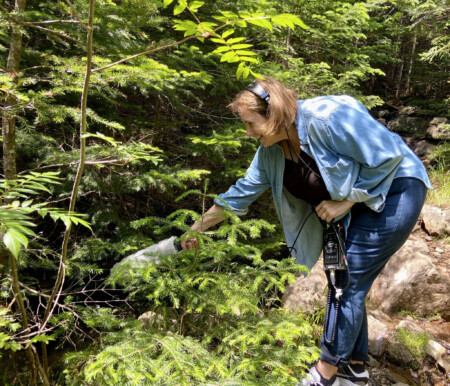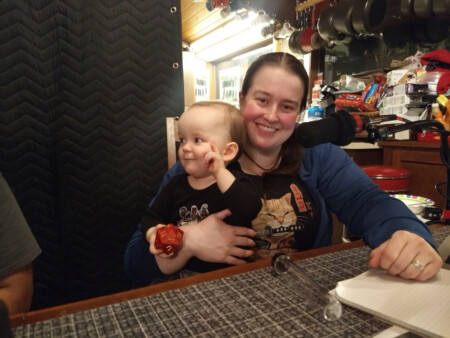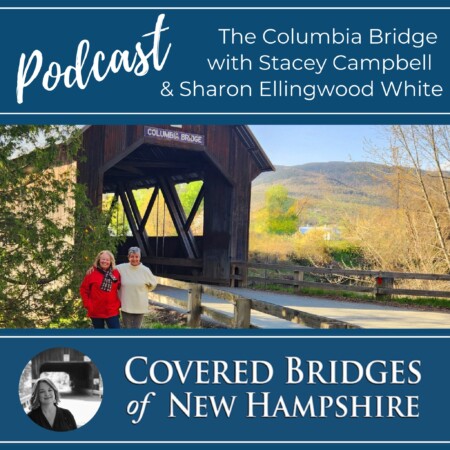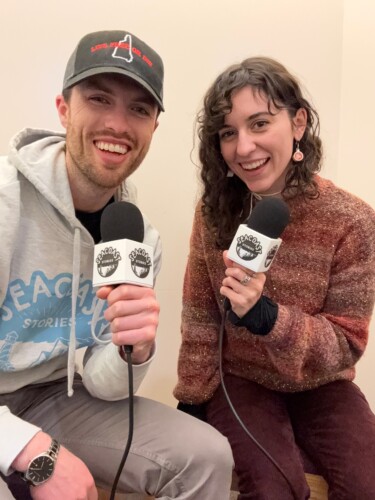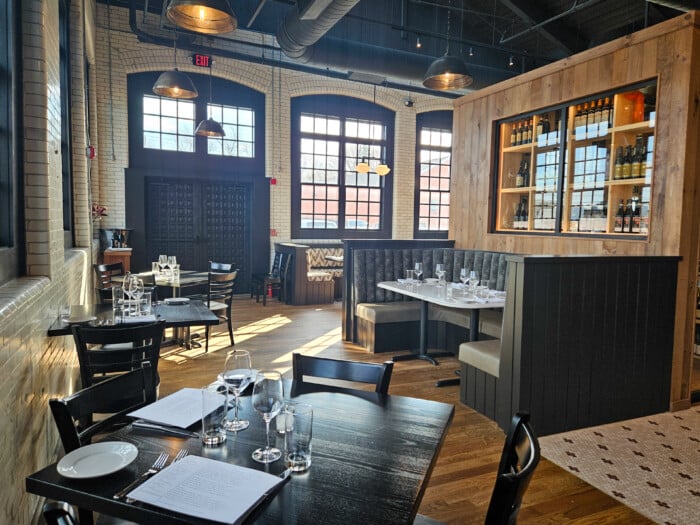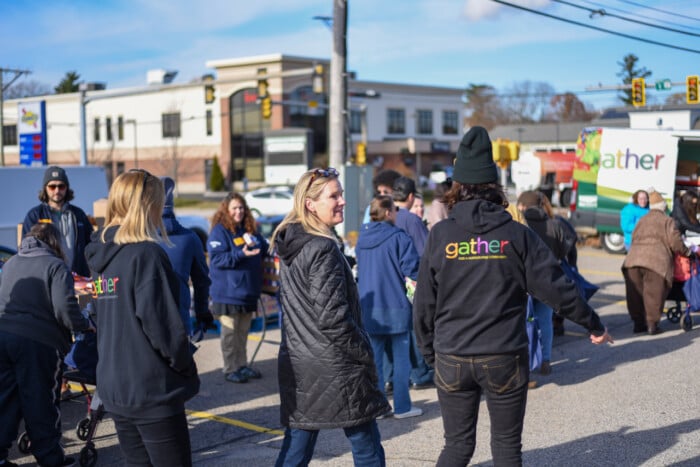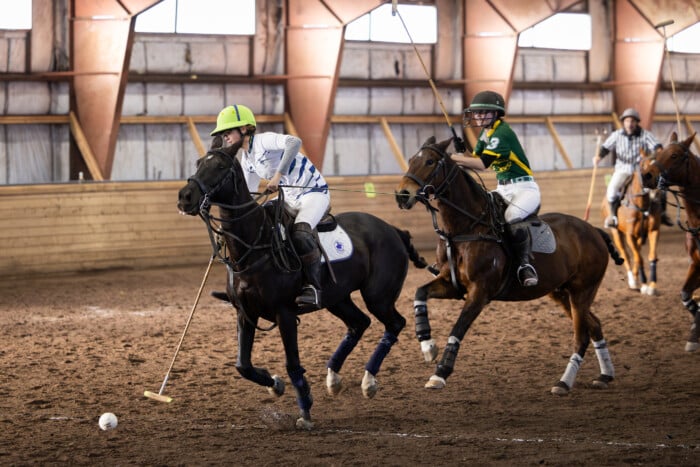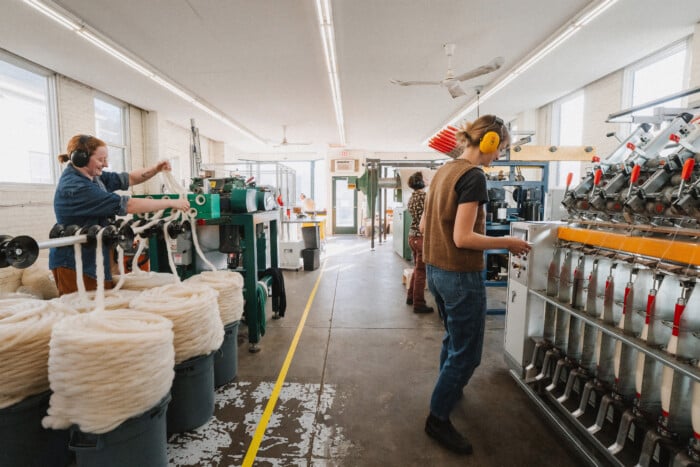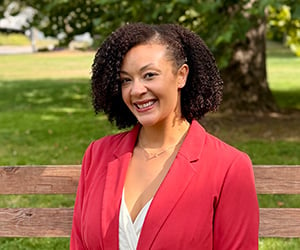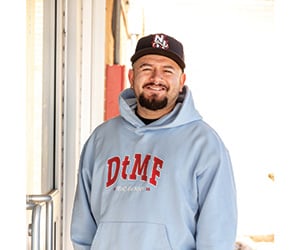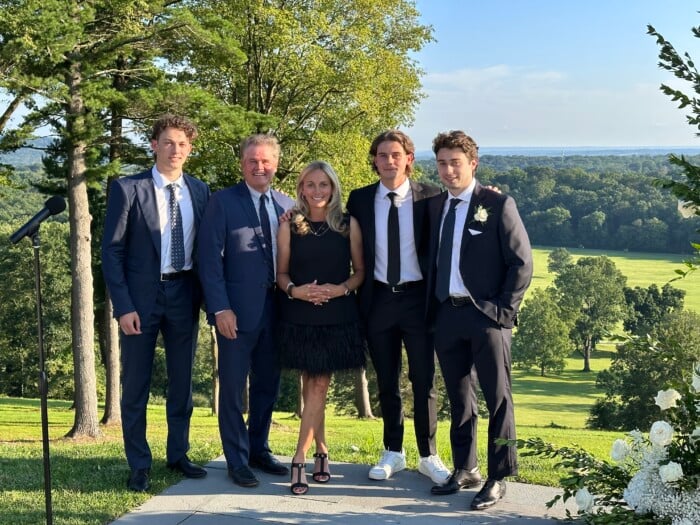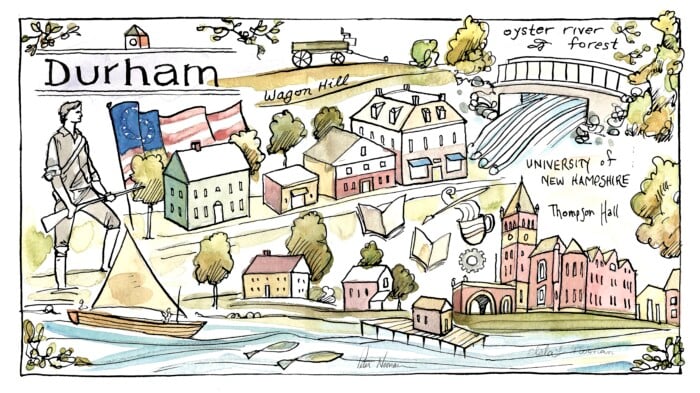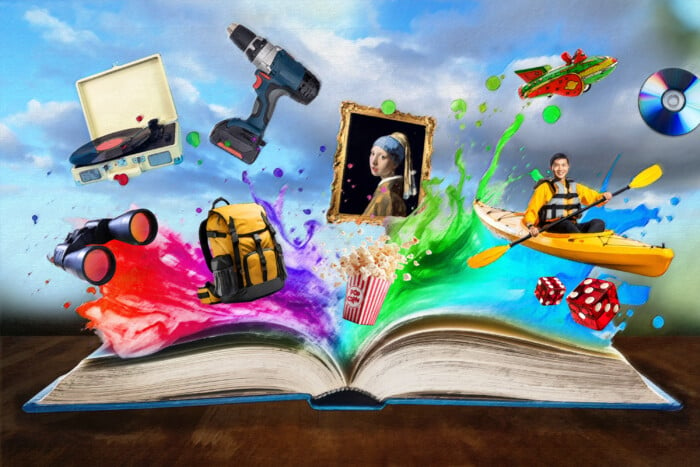Behind the Mic: Meet The Voices Behind New Hampshire’s Biggest Podcasts
New Hampshire is home to dozens of popular podcasts. Meet the voices and digital storytellers behind some of New Hampshire's most popular podcasts
When Troy Farkas decided he wanted to launch a New Hampshire-centric podcast in 2023, part of the motivation was that he felt like there just wasn’t much about our corner of the world. “There’s 6 million podcasts available to be listened to on Spotify,” says Farkas (who’s also a
Spotify producer), but when it came to NH stories, he felt the industry was lacking.
Then, he launched his show. “I realized, ‘Oh wait. There’s actually a bunch of people in this area who do podcasts,’” Farkas says. It’s true: The Granite State is home to plenty of podcasts that span a wide range of genres, from nature and history to business advice and at least one Dungeons & Dragons actual-play series. Here, a few to add to your listening queue.
Something Wild
Genre: Nature
Average episode length: 5 minutes
Start here: “Exploring NH Audubon’s All Persons Trail and Pollinator Garden,” “Why Our Lakes Need Ice,” or “Atop Mt. Washington”
If you listen to “Morning Edition” on NHPR, you’re likely familiar with Chris Martin and Dave Anderson’s banter. The pair has been hosting “Something Wild,” a five-minute show that highlights all aspects of New Hampshire’s natural world, for about 17 years.
“Something Wild” is a partnership between three nonprofits — NHPR, the Society for the Protection of New Hampshire Forests, and NH Audubon — that each bring something to the equation.
“Chris is a scientist (with the Audubon Society), and he’s very careful with his language, and I tend to be a little more on the entertainment side of edutainment,” says Anderson, who does public relations and education for the Forest Society. “I’m trying to joke around and find chinks in his armor, and he’s trying to squelch that.”
Then, of course, there’s their producer, NHPR’s Jessica Hunt, who edits their sometimes hours-long conversations down to those mini stories that drop every two weeks. And they’ll bring in reinforcements when needed.
“Our ace in the hole here is that, if we feel like we’re not really up to speed on a particular topic, we can always find somebody who we know who’s willing to come on and talk with us,” Martin says. “It’s like phoning a friend in the Cash Cab.”
Though the show’s been on the air for decades (it started 10 years before Anderson and Martin joined), they’re never stumped for new episode ideas.
“I will never run out of topics, because all you have to do is look out the window,” Anderson says.
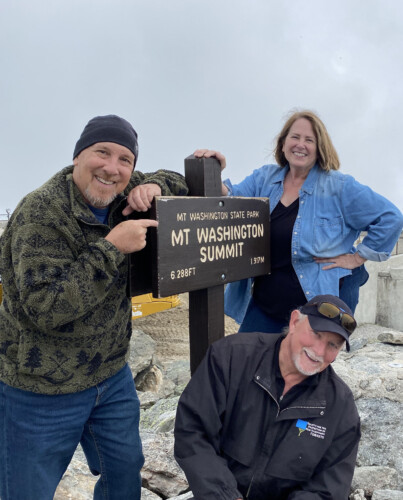
The “Something Wild” team at the top of Mount Washington: Chris Martin, Dave Anderson and Jessica Hunt.
The team tries to record a mix of seasonal and evergreen content, but all of it is local. “We talk about what’s happening in New Hampshire,” Martin says. While they don’t often get political, Hunt felt like, as a nature show, they couldn’t totally ignore climate change. An episode they did about how the phenomenon is affecting lakes in NH remains one of her favorites.
But mostly, they’re just trying to offer a bit of a reprieve.
“I think with the intensity of the news cycle, people are seeking some solace in natural history stories, because it provides something that is not influenced by what people are doing,” Anderson says.
On the radio, their show airs in the middle of the morning news. “It’s like, ‘OK, let’s stop and breathe for five minutes and get a little bit of Zen going.’”
Now that the show is also available in your favorite podcast app, it’s not limited to a New Hampshire audience.
“There are a lot of people who are displaced Granite Staters — in California or Florida or Texas or Iowa — who can get a little dose of New Hampshire even if they’re far away,” Martin says.
“It’s a postcard. It’s four minutes,” Anderson says. “Wouldn’t everybody like to have a naturalist friend who sends them a post-card every other Friday morning that says, ‘Hey, I saw something cool,’ and then tells a little story?”
Knights of Roleplay
Genre: Dungeons & Dragons Actual Play
Average episode length: 1.5 hours
Start with: “Episode 1: Intro to Knights of Roleplay”
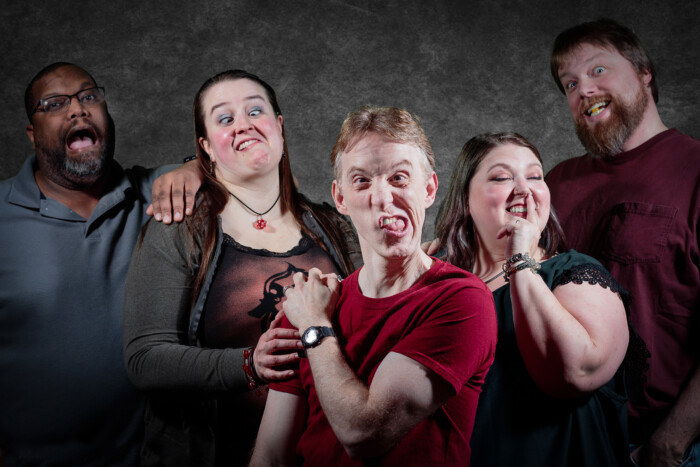
Christopher Buckner and the rest of the Knights of Roleplay team (Kate Worden-Buckner, Greg Holley, John McCollough and Sarah Pattee) love playing around.
For a certain corner of the podcast listening world, actual play shows — that is, shows in which the hosts record themselves playing a tabletop roleplaying game, most famously Dungeons & Dragons — are booming. “Knights of Roleplay” is New Hampshire’s entry into the genre.
“Knights of Roleplay” is the brainchild of Christopher Buckner, a stay-at-home dad and actor who’s been playing D&D since he was 13. He and the rest of the cast — Kate Worden-Buckner, Greg Holley, John McCollough and Sarah Pattee — had been playing D&D together for about five years when he pitched the idea of turning it into a podcast. Buckner says the crew was a little nervous about the idea, but ultimately willing to give it a shot.
“I said to them that if this in any way makes it so we’re not having fun playing Dungeons & Dragons, then we won’t have the podcast,” Buckner recalls. “It’s more important that we’re sitting around a table playing this amazing game.”
Those familiar with other actual play podcasts know there’s a wide range of forms these types of shows can take. On the one end are shows that feel more like a traditional scripted radio show with barely any hint that the dice are leading the plot; on the other end are shows that feel more like you’re listening to someone play a game of D&D, with plenty of dice clinking and table talk about rules. “Knights of Roleplay” is more the latter.
“I wanted people to learn how to play (D&D) by listening,” Buckner says. He’s even recorded shorter “Just the Tips” episodes for beginners. “Those are specifically there to try to give people advice on how to play.”
There are more than 150 episodes of “Knights of Roleplay,” but you don’t necessarily have to start at the beginning: Buckner recorded an intro to the podcast that outlines where specific campaigns start and end. “We have longer campaigns, shorter campaigns, and one-shots,” Buckner says. That intro episode gives listeners a guide for where to start based on how much time they have to listen. When I interviewed Buckner, the gang was in the middle of a fun campaign called The Golden Vault, which follows an “Oceans 11”-esque format where their characters are trying to pull off heists.
So far, recording during their sessions has only had one major effect on the group’s gameplay. “Everybody has to stop eating,” Buckner says. (As a D&D player myself, I can confirm that snacks are typically a crucial part of the setup.) “Crunching and chewing on mic sounds awful.”
Ali on the Run
Genre: Interview
Average episode length: 1 hour
Start with: “Episode 710: Catching Up with Molly Seidel,” “Episode 781: Chris Heuisler, Family Feud Contestant,” or “Episode 677: Live with Ellie Kemper”

Ali Feller and Olympic silver medalist, Boston Marathon champion and NYC Marathon champion Meb Keflezighi at an “Ali on the Run Show LIVE” event during Boston Marathon weekend 2024.
Ali Feller didn’t start running until she was in her 20s. Growing up in Hopkinton, New Hampshire, “I was not into sports. I was not athletic,” she says. “I was very into dance and academics.” But when she moved to New York City to work in magazines, she found herself living with a Craigslist roommate whose marathon medals intrigued her.
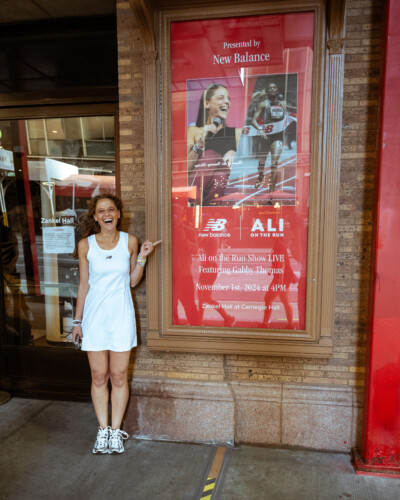
Ali Feller at Carnegie Hall, where she hosted a sold-out live show before the 2024 TCS New York City Marathon.
“She encouraged me to try going for a run,” Feller recalls, noting that the run “lasted about eight seconds before I was gasping for air and winded.” But she was hooked. She started running daily and launched a blog called “Ali on the Run” to write about her newfound hobby. The blog quickly gained an audience, which followed her when she started a podcast with the same name in 2017.
“My goal with the show was just to interview my friends,” she says. “It was an excuse for me to talk to my running buddies.” Eight years later, that’s still the vibe. Most episodes are conversations between Feller and “anyone who enjoys a life on the run,” as she says in the intro. According to Feller, the show has more than 23 million downloads.
While her episodes with well-known runners like Molly Seidel, Keira D’Amato, and Des Linden are always “great for downloads,” she gets the most messages about episodes with everyday runners who have an exceptional life story, like a recent one with a woman who started running as a way to raise money for the Herren Project after her brother died
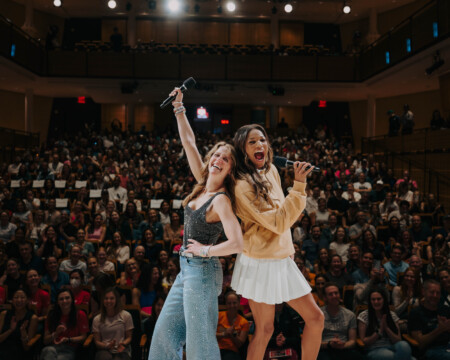
Ali Feller and three-time Paris Olympic gold medalist Gabby Thomas at “Ali on the Run Show LIVE” at Carnegie Hall in New York City during the 2024 TCS New York City Marathon weekend.
from an accidental overdose. A couple of years ago, Feller interviewed both the winner and the last-place finisher from the New York City Marathon.
“Part of my goal is that this is a very inclusive space where people feel seen, they feel represented, and they know this is a place for them” regardless of where they’re at in their running journey, she says.
Feller currently lives in NH with her 6-year-old daughter and dog. She gives listeners glimpses into her life in the Granite State with her occasional solo episodes, where she answers listener questions. Feller is open about many aspects of her life beyond running, including her journeys with breast cancer and Crohn’s disease.
“I let (my listeners) in on my life as much as I feel comfortable. We call each other our best running friends,” Feller says. “I take that pretty seriously. The community to me is everything.”
Covered Bridges
of New Hampshire
Genre: History
Average episode length: 45 minutes
Start here: “The Columbia Bridge” with Stacey Campbell and Sharon Ellingwood White
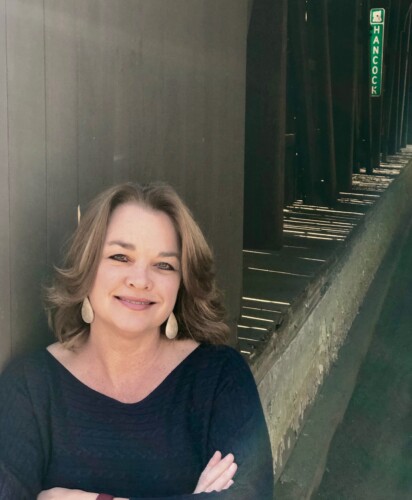
Kim Varney Chandler interviews members of the bridge community about a variety of topics related to
New Hampshire’s covered bridges on “Covered Bridges of New Hampshire.”
Of all the podcasts in this story, “Covered Bridges of New Hampshire” wins the superlative for clearest title. The show is exactly what it sounds like: a comprehensive history of the more than 50 covered bridges in the Granite State. It’s hosted by Kim Varney Chandler, a self-described “wicked podcast nerd” who published a book of the same name in 2022.
Varney Chandler has been a high school counselor for 29 years, but history has always been her side hobby. The book and podcast were “really just by accident,” she says. “I did not intend to do this.” In 2012, she and her husband moved to Hancock, home to the Hancock-Greenfield covered bridge, which sparked something in her.
“I got myself a list (of covered bridges) in the area,” Varney Chandler says. “I got very excited.”
She started photographing the bridges in her free time, which led her to the Historical Society of Cheshire County in an attempt to research the bridges’ history.
Seeing her passion for the topic, the former executive director of the Historical Society, Alan Rumrill, suggested she write a book.
“I was like, ‘I can’t write a book,’” Varney Chandler recalls. “And he said, ‘Anybody can write a book.’ Apparently, he was right.”
There are essentially two types of “Covered Bridges” podcast episodes: Varney Chandler and her guest(s) chat either about the history of one specific bridge (like “The Dalton Family with Rebecca Courser”) or the covered bridge-related history of an entire region (like “The Lost Bridges of Cheshire County with Alan Rumrill”). All are a delight for anyone who enjoys a nerdy deep dive into a fairly niche topic.
For a while, it looked like all covered bridges would become structures of the past, as towns replaced them with larger bridges that could hold cars. Some were destroyed by floods, though Varney Chandler says arson is still the No. 1 cause of lost covered bridges. When that happens, “it’s cheaper and faster for communities to put a concrete and steel bridge than it is to … put in authentic covered bridges,” she says.
In larger cities, like Concord, which used to have several, covered bridges simply aren’t practical. “The traffic would be backed up everywhere,” Varney Chandler says.
But some communities see the value in preserving that piece of history. Varney Chandler says the town of Bradford recently did a giant bridge rehab project on their covered bridge.
“They raised (the funds) through their tax base,” she says. “They had a warrant article that just passed. There was no debate or arguing: It just passed.”
Bear Brook
Genre: True Crime
Average episode length: 40 minutes
Start with: “Episode 1: Hide and Seek”
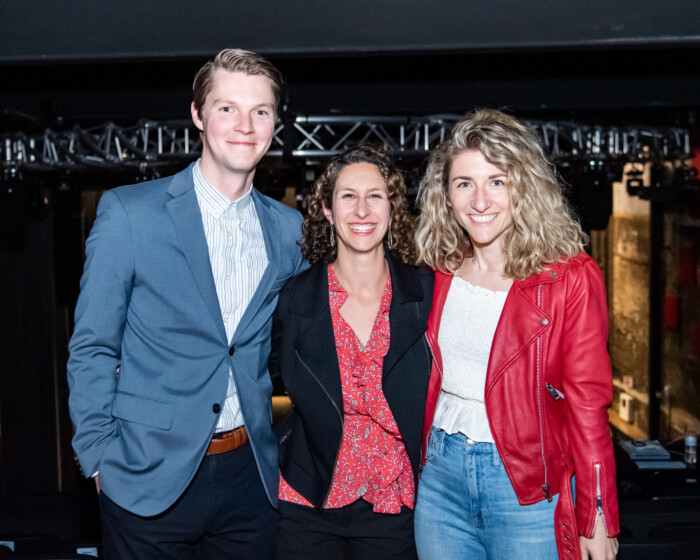
NHPR’s Document team, from left to right: Jason Moon, host of “Bear Brook” and senior reporter; Katie Colaneri, senior editor of Document; and Lauren Chooljian, producer and senior reporter.
The “Bear Brook” podcast started “in the most boring way possible … a press release from the attorney general’s office,” host Jason Moon says.
In 2015, since Moon was the lowest-ranking person at the New Hampshire Public Radio office, he was assigned to cover the press conference, which was about new evidence in a New Hampshire cold case.
What followed was three years of reporting on the case of the Bear Brook victims, an adult woman and three children whose remains were found — the first two in 1985 and the second pair in 2000 — in barrels in Bear Brook State Park in Allenstown. The victims remained identified for decades, and one is still unknown. According to Moon, the show has been downloaded “tens of millions of times.”
Moon’s reporting focuses on two methods of investigation that uncovered clues about the victims’ identities — radioisotope testing and forensic genetic genealogy (a newer forensic technique that also played a part in uncovering the Golden State Killer’s identity) — and the amateur sleuths who were scouring the internet for clues.
“I had two very different angles on the story,” Moon says of why they ultimately decided this needed to be a whole series, rather than a 6-minute spot on the radio. “I had a story about science and isotopes and atoms, and then I had a very human-centered profile story of a woman who was so obsessed with this case that she was going to the local library and reading the phone book until she got motion sickness looking for names of these people.”
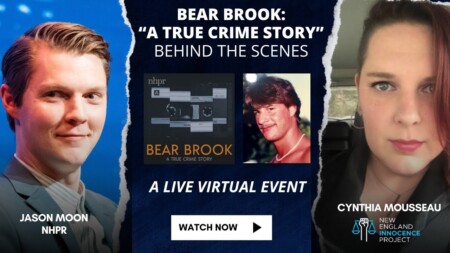
Stephen King called the “Bear Brook” podcast “the best true crime podcast I’ve ever heard. Brilliant, involving, hypnotic.”
Season 2 of the podcast focuses on Jason Carroll, a man who was convicted of a murder in 1992 based solely on a confession he gave when he was 19. Now, Carroll is working with the New England Innocence Project in hopes that his conviction will be overturned.
When asked how he picks stories to focus on, Moon says, “I do want my stories to be entertaining, but that’s not the main reason I’m doing this. I’m doing them to hopefully reveal something that’s in the public interest for people to know about … It’s not enough to have a good story. It has to be a good story that speaks to something larger than the sum of the events of the story itself.”
Seacoast Stories
Genre: Business…ish
Average episode length: 1 hour
Start with: “How Flamingos Coffee Bar Became ‘Disgustingly Pro Woman’” or “F*ck the Bluprint! Ankati Day’s Journey from Costa Rican Jungles to Hosting Portsmouth’s Best (and Most Bizarre) Saturday Night Out”
Troy Farkas, the host of “Seacoast Stories,” is a native of upstate New York who moved to New Hampshire in 2023 after traveling for years. “I was checking a lot of things off the bucket list, and then I got tired of the constant uprooting of my life,” he says.
At first, living in NH was not great. Farkas landed in the hospital with a Type 1 Diabetes diagnosis, then got dumped “on top of a parking garage in Portsmouth.” He felt the universe was telling him it was time to move on, until he had another diabetes-related health scare during a yoga class. The instructor comforted him during class, then sent a follow-up email asking if he was OK. The same thing happened a few days later with a local gym owner. Feeling supported by the community convinced him to stay, and soon after, he launched “Seacoast Stories.”
It’s technically a business podcast because that’s the box Farkas checks on the back end of the podcast players, but calling it such doesn’t encompass the wide range of conversations he has with his guests. Yes, Farkas often books people who could be considered micro-celebrities in the world of Seacoast businesses. The most downloaded episode is with the owners of Vernon Family Farm in Newfields, which has a strong fanbase but has also made headlines for disputes with neighbors who aren’t thrilled about the live events the family throws on the farm.
“It’s a story that people feel very strongly about either way,” Farkas says.
But he’s also speaking with people who fall more into the artist side of things, like Ankati Day, a yoga teacher who hosts ecstatic dance classes on Saturday nights, and Jezmina Von Thiele, an author and Sinti Romani fortune teller.
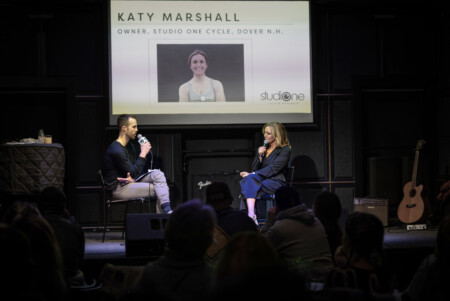
Troy Farkas talks to Katy Marshall of Studio One in Dover during his sold-out live podcast show in January.
“When I describe this to people, I say it’s local stories and personal journeys of people on the Seacoast who are doing big things,” Farkas says.
The podcast launched less than a year ago, but Farkas said his inbox is already flooded with pitches from other people who want to come on the show. He’s willing to talk to just about anyone, as long as he’s interested in what they do. “There’s a desire to hear from local people,” Farkas says of why he suspects the show is so successful. “And the stories of these people aren’t being as widely told as they should be.”
Confessions of a full-time NH podcaster
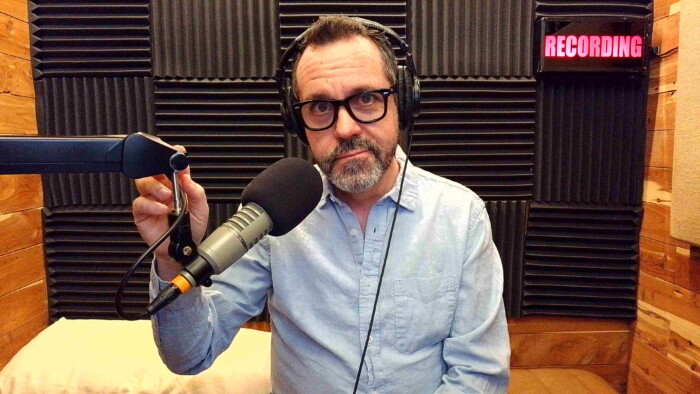 When “Serial” became a phenomenon, one day in the car, I turned to my wife, Rebecca Lavoie, and said, “We should make our own podcast talking about episodes of ‘Serial.’” We’d written five true crime books together and worked in radio. It just might work …
When “Serial” became a phenomenon, one day in the car, I turned to my wife, Rebecca Lavoie, and said, “We should make our own podcast talking about episodes of ‘Serial.’” We’d written five true crime books together and worked in radio. It just might work …
We fashioned a studio in a cedar closet and produced “Crime Writers On.” Since 2014, our panel — which includes local authors Lara Bricker and Toby Ball — has been doing thumbs up/thumbs down reviews of true crime podcasts. Our takes on good storytelling, quality production and ethical reporting have made us tastemakers in the space — influencing both listeners and podcast creators.
Ashley Flowers was an early fan before creating the juggernaut “Crime Junkie.” Actress Alison Sweeney went from CWO listener to creating the “Chronicle Mysteries” series on Hallmark Channel, playing a crime-solving podcast host. And imagine our shock to hear directly from THE Steve Martin that he’s a listener. That scene in episode 1 of “Only Murders in the Building” in which he, Martin Short and Selena Gomez bond by drinking wine and discussing “All is Not OK in Oklahoma” is an homage to us. (“I’m all for a good peeling of the onion, but let’s pace it up, people! Please!”)
Our reach extends far beyond New Hampshire. Our live show in Concord drew a crowd of only about 30, but in Dallas we played to a room of more than 150. One quarter of our audience is international. We’ve done meet-and-greets in Denver, Dallas and Nashville, but also London, Toronto and Dublin. (Stay tuned, Melbourne. Someday …)
Since 2020, running our company “Partners In Crime Media” has been my full-time job. I also host a podcast called “These Are Their Stories,” with funny takes on “Law & Order” ripped-from-the-headlines cases. It once was a lightning-round question on ABC’s game show “The Chase.”
I spend each month, six-plus days a week, creating up to 21 episodes for the seven different podcasts. That includes research, script writing, recording, editing and social media promotion. I find a growing amount of my time going into creating video clips of our audio podcast for YouTube, IG and TikTok.
Our biggest project is a co-production with Netflix. “You Can’t Make This Up” features conversations with filmmakers about their upcoming documentaries. The show won a 2025 iHeartPodcast award at a red carpet event at SXSW. For us, “Netflix and chill” is a workplace assignment, not a romantic evening on the couch.
The question I hear most often is “how do you make money doing that?” Aside from network deals, we are on Patreon.com. People pay between $5 and $50 a month to receive exclusive content or other perks. It’s like OnlyFans, but no one takes their clothes off.
We also make money the old-fashioned way: We sell ads. In podcasting, however, the most effective ads are personal endorsements from hosts. So when we say we love Bombas socks, it’s because they gave us a whole bunch of socks. The same for Third Love bras, Warby Parker glasses, and Brooklinen sheets. Our kitchens have been filled with food-through-the-mail services like Blue Apron, Hello Fresh, Butcherbox, plus a wine club or two. Did I mention the free Sleep Number adjustable bed? Who’d believe Casper mattresses would put three kids through college. (Use promo code “crime.”)
Ten years, 75 million downloads, and 1,500 hours of audio later, that car ride changed our lives. All produced — not in New York or L.A. — but in a basement cedar closet in the Granite State. As the tagline goes: listen wherever you get your podcasts!
Kevin Flynn is an award-winning broadcaster, author and podcast producer from Hopkinton.
